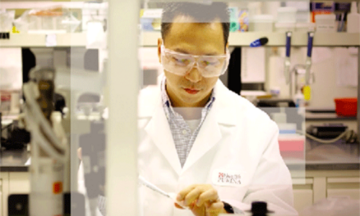Microbiome Fundamentals

The gastrointestinal tract presents the body’s largest surface to the environment.1 The role of the intestinal tract goes far beyond digestion.
While the gastrointestinal tract (gut) is the center of food digestion and nutrient absorption, it also plays a key role in pets’ overall health.
Known functions of the gut microbiome include:2,3
- Harvesting of food for energy
- Providing nutrients for the host via fermentative and metabolic activities
- Breaking down dietary fibers
- Developing the immune system and maintaining homeostasis
- Processing polysaccharides and vitamins
- Producing hormones
- Defending against intestinal pathogens
The gut is home to hundreds of different species of bacteria and other microorganisms such as protozoa, archaea, viruses and fungi.
The number of microorganisms living in the gut is in the trillions – there are at least as many microbial cells in the gut as there are cells in the entire body.4 Current literature estimates 1010-1014 microbial cells.2 These resident microorganisms (or commensal bacteria) play roles in energy regulation, mineral absorption, vitamin synthesis, gut barrier function, and the functioning of the immune system. They also provide a barrier against pathogens, and help to nourish the gut.


The gut microbiome forms a crucial part of the bidirectional interaction between gut and brain known as the gut-brain axis,5 and there is growing evidence that the microbiome impacts the health of other organs such as the skin,6 heart and kidneys.
Explore other areas of the Microbiome Forum

Microbiome-Centric Interventions for Pet Health Conditions

Nestlé and Purina Leadership in the Microbiome
Find out more
- Richards, P., Thornberry, N. A., & Pinto, S. (2021). The gut-brain axis: Identification of new therapeutic approaches for Type 2 diabetes, obesity, and related disorders. Molecular Metabolism, 46, 101175. doi:10.1016/j.molmet.2021.101175
- Belas, A., Marques, C., & Pomba, C. (2020). The gut microbiome and antimicrobial resistance in companion animals. In Duarte, A. & Lopes da Costa, L. (Eds.), Advances in Animal Health, Medicine and Production (1st ed.), pp. 233–245. Springer International Publishing
- Blake, A. B. & Suchodolski, J. S. (2016). Importance of gut microbiota for the health and disease of dogs and cats. Animal Frontiers, 6(3), 37—42. doi:10.2527/af.2016-0032
- Sender, R., Fuchs, S., & Milo, R. (2016). Revised estimates for the number of human and bacteria cells in the body. PLoS Biology, 14(8):e1002533. doi:10.1371/journal.pbio.1002533
- Oriach, C. S., Robertson, R. C., Stanton, C., Cryan, J. F., & Dinan, T. G. (2016). Food for thought: The role of nutrition in the microbiota-gut-brain axis. Clinical Nutrition Experimental, 6, 25–38.
- van Splunter, M., Lui, L, Joost van Neerven, R. J., WIchers, H. J., Hettinga, K. A., & de Jong, N. W. (2020). Mechanisms underlying the skin-gut cross talk in the development of IgE-mediated food allergy. Nutrients, 12, 3830. doi:10.3390/nu12123830
- Summers, S. C., Quimby, J. M., Isaiah, A., Suchodolski, J. S., Lunghoger, P. J., & Gustafson, D. L. (2019). The fecal microbiome and serum concentrations of indoxyl sulfate and p-cresol sulfate in cats with chronic kidney disease. Journal of Veterinary Internal Medicine, 33(2), 662–669. doi:10.1111/jvim.15389
- Suchodolski, J. S., Camacho, J., & Steiner, J. M. (2008). Analysis of bacterial diversity in the canine duodenum, jejunum, ileum, and colon by comparative 16S rRNA gene analysis. FEMS Microbiology Ecology, 66, 567–578.
- Suchodolski, J. S. (2011). Microbes and gastrointestinal health of dogs and cats. Journal of Animal Science, 89, 1520—1530. doi:10.2527/ jas.2010.3377
- Suchodolski, J.S. (2011). Intestinal microbiota of dogs and cats: a bigger world than we thought. Veterinary Clinics of North America Small Animal Practice, 41, 261—272. doi:10.1016/j. cvsm.2010.12.006
- Suchodolski, J.S. (2012). “Microbiota in health and disease.” Nestlé Purina Companion Animal Nutrition Summit, Lisbon, Portugal, pp. 33–37.
- Honneffer, J. B., Steiner, J. M., Lidbury, J. A., & Suchodolski, J. S. (2017). Variation of the microbiota and metabolome along the canine gastrointestinal tract. Metabolomics, 12, 26. doi:10.1007/s11306-017-1165-3
